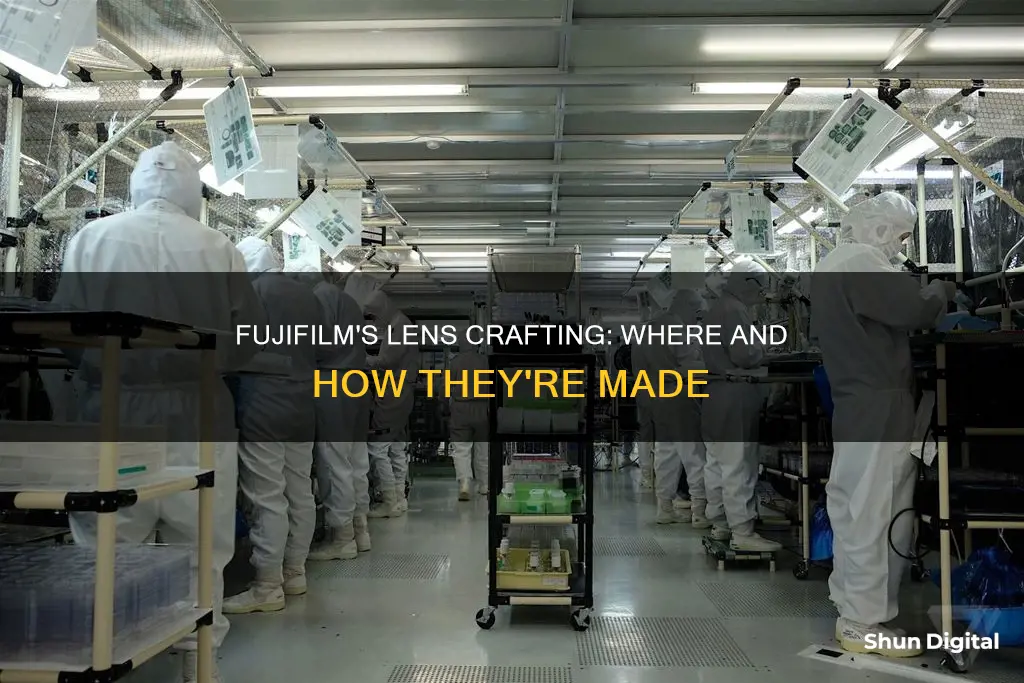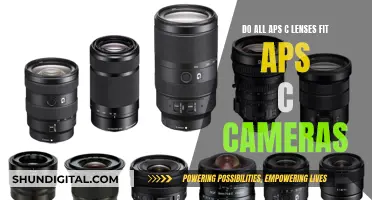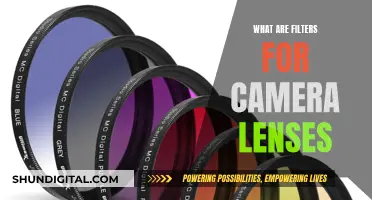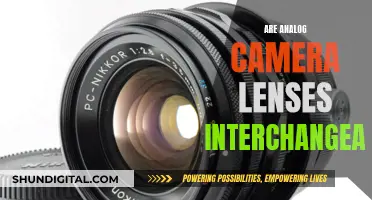
Fujifilm Holdings Corporation, trading as Fujifilm, is a Japanese multinational conglomerate headquartered in Tokyo, Japan. The company was established in 1934 as a manufacturer of photographic films and entered the optical glasses, lenses, and equipment markets in the 1940s. Today, Fujifilm produces a range of products, including digital cameras and camera lenses. The manufacturing of Fujifilm camera lenses takes place primarily in Japan, with some additional facilities in China and the Philippines. The company's optics subsidiary, Fujifilm Optics Co., has factories in Japan that handle glass moulds, barrel processing, and lens polishing, while facilities in China and the Philippines handle polishing and subassembly for other lenses. The Taiwa factory in Sendai, Japan, is responsible for the final assembly of prestigious products, including the X-Pro2 camera and lenses such as the 35mm f/2 and the 100-400mm f/4.5-5.6.
| Characteristics | Values |
|---|---|
| Company | Fujifilm Holdings Corporation |
| Headquarters | Tokyo, Japan |
| Factory Location | Taiwa Factory, Sendai, Japan |
| Factory Operations | Final assembly, glass moulds, barrel processing, lens polishing, subassembly |
| Products | Fujinon XF100-400mm f/4.5-5.6 R LM OIS WR, XF35mm f/2 R WR, X-Pro2, X-T1, X100T, X-T2, GFX 50S |
| Production Time | 220 minutes for 100-400mm zoom, 80 minutes for 35mm prime, 20 minutes for X-Pro2 |
| Production Capacity Increase | 70% by 2020 |
| Production Process | Hand-assembly, UV bonding, automated machinery |
| Quality Assurance | At least seven tests and inspections, dust inspection, resolution testing |
| Optics Subsidiary | Fujifilm Optics Co. |
| Optics Subsidiary Factories | Japan (4), China (2), Philippines (2) |
What You'll Learn

Fujifilm's camera lenses are manufactured in Japan
The Taiwa Factory of Fujifilm Optics Co., Ltd. in Sendai, Japan, is responsible for the production of Fujifilm's camera lenses. This factory handles the final assembly of Fujifilm's prestigious products, including the X100T, the X-T1, and the X-Pro2. The metal body of the X-Pro2, for example, is cast in another factory in Japan before being shipped to the Taiwa Factory for assembly.
Fujifilm Optics Co. has three other factories in Japan that specialise in glass moulds, barrel processing, and lens polishing. The company takes pride in its craftsmanship, with many of its camera lenses being assembled by hand with meticulous care and attention to detail.
The company's commitment to quality is evident in its investment in additional production facilities at the Taiwa Factory to meet the growing demand for mirrorless digital cameras. This expansion demonstrates Fujifilm's dedication to maintaining its high standards while increasing production capacity.
Fujifilm's history in the optics business dates back to the 1940s, and its Fujinon lenses are widely used not only in photography but also in medical equipment, cinematography, and satellites. The "Made in Japan" engraving on Fujifilm products is a badge of quality and craftsmanship recognised both within Japan and internationally.
Lenses for Full-Frame Cameras: What's the Difference?
You may want to see also

The Taiwa factory in Sendai handles final assembly
The Taiwa factory in Sendai, Japan, handles the final assembly of Fujifilm's most prestigious products, including the X100T, the X-T1, the X-Pro2, and the GFX 50S, as well as lenses like the 35mm f/2 and the 100-400mm f/4.5-5.6. The metal body of the X-Pro2, for example, is cast in another factory in Japan and then shipped to the Taiwa factory for final assembly.
The Taiwa factory is part of Fujifilm Optics Co., Ltd., a subsidiary of Fujifilm that produces cameras and lenses. In 2018, Fujifilm announced plans to expand the production capacity of the Taiwa factory by adding new facilities to address the growing demand for mirrorless digital cameras and interchangeable lenses. The expansion aimed to increase production capacity by approximately 70% by 2020.
The factory features a large-scale cleanroom and advanced equipment, including a cleanroom analyzer and AI-powered optical adjustment devices. These technologies enable the production of high-quality, ultra wide-angle, and large-diameter lenses, which require precise image-resolving performance.
The assembly process at the Taiwa factory involves a significant amount of hand-assembly by skilled workers. Each lens undergoes multiple tests and inspections to ensure quality, with a focus on resolution and dust inspection. The assembly time varies depending on the complexity of the lens, with the 100-400mm zoom lens taking about 220 minutes, while the simpler 35mm lens takes around 80 minutes.
In addition to lens assembly, the Taiwa factory also handles the production of Fujifilm cameras, including the X-T1 and the X-Pro2. The assembly of these cameras also requires a certain amount of hand-work, and the factory can produce about 800 X-Pro2 bodies per day.
Understanding Camera Lenses: Magnification Options for Photographers
You may want to see also

Fujifilm Optics Co. has three other factories in Japan
The Taiwa factory in Sendai, Japan, is responsible for the final assembly of Fujifilm's most prestigious products, including the X100T, the X-T1, and the X-Pro2, as well as lenses like the 35mm f/2 and the 100-400mm f/4.5-5.6. The Taiwa factory also produces the X-T2 camera and GFX 50S camera and lenses.
The process of making a lens involves a lot of hand-assembly and can take up to four hours. Each lens undergoes at least seven different tests and inspections, including a final visual inspection before being engraved with a serial number and the words "Made in Japan". The most complex part of the lens manufacturing process is the quality assurance testing, especially the resolution.
Fujifilm Optics Co.'s Taiwa Factory is located about 20 miles from central Sendai city and can be reached by a 45-minute bus ride. The factory is committed to producing high-quality products, as evidenced by the "Made in Japan" badge proudly etched on its mirrorless cameras.
Lenses Unlocked: Capturing Unique Perspectives and Effects
You may want to see also

Fujifilm dates its optics business to the 1940s
Fujifilm Holdings Corporation, or simply Fuji, is a Japanese multinational conglomerate headquartered in Tokyo, Japan. The company started as a manufacturer of photographic films in 1934 as a subsidiary of Daicel. In the 1940s, Fuji Photo entered the optical glasses, lenses, and equipment markets. Fujifilm dates its optics business to the 1940s, and its Fujinon lenses are used in a variety of products, including medical equipment, high-end cinematography, and satellites. The company has since expanded its operations globally and diversified its product offerings to include optics, office and medical electronics, biotechnology, and chemicals.
The Fujifilm Optics Co. subsidiary turns raw materials into finished products, with factories in Japan, China, and the Philippines. The Taiwa factory in Sendai, Japan, handles the final assembly of Fujifilm's most prestigious products, including the X100T, the X-T1, and the X-Pro2 cameras, as well as lenses like the 35mm f/2 and the 100-400mm f/4.5-5.6. The metal body of the X-Pro2, for example, is cast in another factory in Japan and then shipped to Taiwa for final assembly.
Fujifilm's lenses are used in a variety of applications, from capturing images of the Moon to creating movies, TV shows, and sporting events. The company has also received Academy Awards for Best Picture for three consecutive years, with films captured on Fujifilm colour negative motion picture film.
In 2011, Fujifilm created the world's first hybrid viewfinder, a FUJINON lens, and a large APS CMOS sensor, redefining high-end compact digital cameras. The company continues to innovate and expand its product offerings, solidifying its position as a leader in the optics and imaging industries.
Fuji Mirrorless Camera: Compatible Lenses for Your Camera
You may want to see also

The company's lenses are assembled by hand
The prime lens, Fujifilm's XF35mm f/2 R WR, is far simpler to build than the 100-400mm zoom, but it still requires a lot of hand work. Each 35mm lens takes about 80 minutes to build. The process combines a lot of painstaking handwork with some automation. The factory chief noted that the most complex part of Fujifilm's camera lens manufacturing process is the quality assurance testing, especially resolution.
The Taiwa Factory handles the final assembly of Fujifilm's most prestigious products, including the X100T, the X-T1, and the X-Pro2, as well as lenses like the 35mm f/2 and the 100-400mm f/4.5-5.6. The Taiwa Factory is not the only facility involved in the production of Fujifilm lenses, however. Fujifilm Optics Co. has three other factories in Japan that deal with glass moulds, barrel processing, and lens polishing. There are also factories in China and the Philippines that handle polishing for other lenses, and two in China for subassembly.
The company's lenses are crafted by hand, with workers in the clean room assembling, inspecting, and fine-tuning hundreds of lenses. The Taiwa Factory is just one part of Fujifilm's lens manufacturing process, which involves multiple facilities and a combination of hand assembly and automation.
Interchangeable Lenses: Mirrorless Camera Flexibility Explored
You may want to see also
Frequently asked questions
Fujifilm manufactures its camera lenses at the Taiwa Factory of Fujifilm Optics Co. in Japan.
The Taiwa Factory handles the final assembly of Fujifilm's most prestigious products, including the X100T, the X-T1, the X-T2, the X-Pro2, the GFX 50S, and lenses like the 35mm f/2, the 100-400mm f/4.5-5.6, and the 100-400mm f/4.5-5.6 R LM OIS WR.
The manufacturing process at the Taiwa Factory combines a lot of handwork with some automation. Each lens undergoes inspections and tests, with a focus on quality assurance and resolution. The factory also has automated machinery for dust inspection and can detect micron-level displacement in the glass.







